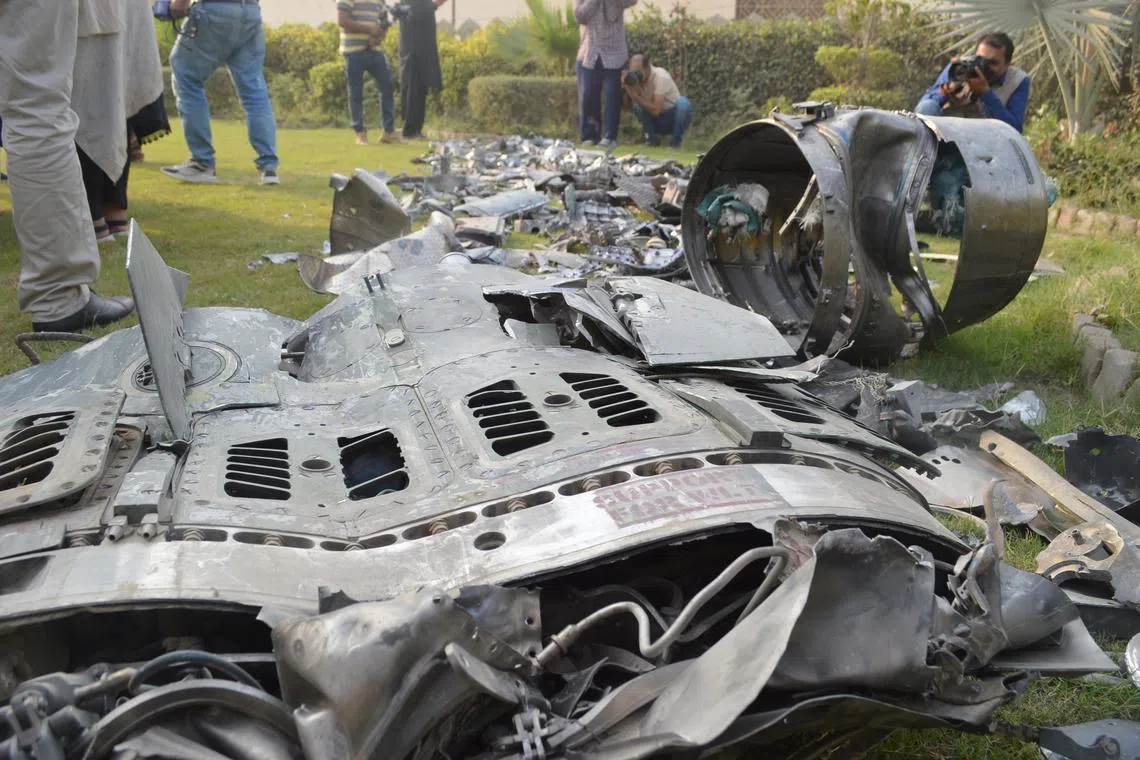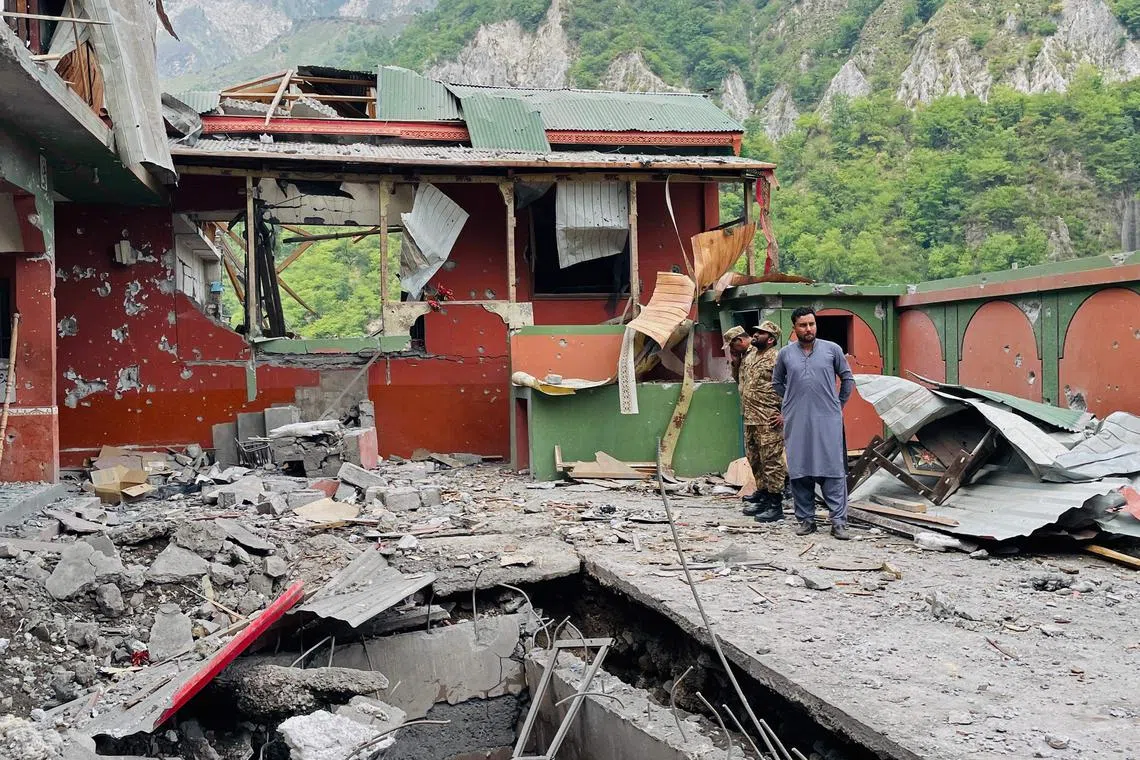Dozens killed as India, Pakistan clash in worst violence in decades
Sign up now: Get insights on Asia's fast-moving developments
Follow topic:
ISLAMABAD – India and Pakistan exchanged heavy artillery fire along their contested frontier on May 7, after New Delhi launched deadly missile strikes on its arch-rival, in the worst violence between the nuclear-armed neighbours in two decades.
At least 38 deaths were reported, with Islamabad saying 26 civilians were killed by the Indian strikes and firing along the border, and New Delhi adding at least 12 dead from Pakistani shelling.
The fighting came two weeks after New Delhi blamed Islamabad for backing an attack on the Indian-run side of disputed Kashmir,
The South Asian neighbours have fought multiple wars since they were carved out of the sub-continent at the end of British rule in 1947.
The Indian army said “justice is served”, reporting nine “terrorist camps” had been destroyed, with New Delhi adding that its actions “have been focused, measured and non-escalatory in nature”.
Pakistan Defence Minister Khawaja Muhammad Asif accused Indian Prime Minister Narendra Modi of launching the strikes to “shore up” his domestic popularity, adding that Islamabad “won’t take long to settle the score”.
Pakistan military spokesman Ahmed Sharif Chaudhry said five Indian jets had been downed across the border overnight.
An Indian senior security source, who asked not to be named, said three of its fighter jets had crashed on home territory.
Children among the dead
The largest Indian strike was on an Islamic seminary near the Punjabi city of Bahawalpur, killing 13 people according to the Pakistan military.
A government health and education complex in Muridke, 30 km from Lahore, was blown apart, along with a mosque in Muzaffarabad – the main city of Pakistan-administered Kashmir – killing its caretaker.
Four children were among those killed in May 7’s attacks, according to the Pakistan military.
Pakistan also said a hydropower plant in Kashmir was also targeted by India, damaging a dam structure, after India threatened to stop the flow of water on its side of the border.
Pakistan had earlier warned that tampering with the rivers that flow into its territory would be an “act of war”.
India’s Defence Minister Rajnath Singh said the overnight operation was New Delhi’s “right to respond” following the attack on tourists in Pahalgam in Kashmir last month.
Pakistan had denied any involvement in the Pahalgam assault and called for an independent probe.
Prime Minister Shehbaz Sharif labelled India’s strikes a “heinous act of aggression” that would “not go unpunished” and his National Security Committee called on the international community to hold India “accountable”.

The wreckage of missiles fired by India near Bahawalpur, Pakistan.
PHOTO: EPA-EFE
‘Terrible sounds in the night’
In Muzaffarabad, United Nations military observers arrived to inspect a mosque that Islamabad said was struck by India.
“There were terrible sounds during the night, there was panic among everyone,” said Mr Muhammad Salman, who lives close to the mosque.
“We are moving to a safer place... we are homeless now,” said 24-year-old Tariq Mir, who was hit in the leg by shrapnel.

In Muzaffarabad, the main city of Pakistan-administered Kashmir, troops cordoned off streets around a mosque Islamabad said was hit.
PHOTO: AFP
Residents collected damaged pieces of the Quran among concrete, wood and iron debris scattered across the grounds.
In Indian-held Kashmir, residents fled in panic from the Pakistan shelling.
“There was firing from Pakistan, which damaged the houses and injured many,” said Mr Wasim Ahmed, 29, from Salamabad village.
“They were taken to hospitals in Uri and Baramulla towns. There has been extensive damage here, everything is destroyed, and people are fleeing the area.”
Maximum restraint
India had been widely expected to respond
The two nations have traded days of threats and tit-for-tat diplomatic measures, while Pakistan has conducted two missile tests.
The Indian army has reported nightly gunfire along the heaviliy militarised Line of Control that separates the region since April 24.
“Escalation between India and Pakistan has already reached a larger scale than during the last major crisis in 2019, with potentially dire consequences”, International Crisis Group analyst Praveen Donthi said.
Diplomats have piled pressure on leaders to step back.
“The world cannot afford a military confrontation between India and Pakistan,” the spokesman for UN chief Antonio Guterres, Stephane Dujarric, said in a statement.
US President Donald Trump told reporters in Washington
Concern poured in, including from China – a mutual neighbour of both nations – as well as from the EU, Britain, France, Russia, Germany and Turkey, while airlines have cancelled, diverted or rerouted flights.
Iranian Foreign Minister Abbas Araghchi is expected in New Delhi on May 7, two days after a visit to Islamabad, as Tehran seeks to mediate.
Rebels in Indian-administered Kashmir have waged an insurgency since 1989, seeking independence or a merger with Pakistan.
India regularly blames its neighbour for backing armed groups fighting its forces in Kashmir, a charge that Islamabad denies.

